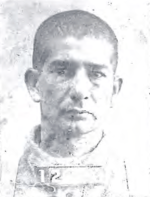 Mugshot Broulio Galindo, Jose Hernandez and Salvador Mendival, three Mexican nationals, were convicted of robbing First National Bank of Arcadia in 1922. The convictions were based on erroneous eyewitness identifications and other circumstantial evidence inconsistent with the facts of the crime. On April 5, 1922, the First National Bank of Arcadia, located about 20 miles outside of Los Angeles, California, was robbed by three armed but unmasked men. A fourth man driving a Chevrolet, which the robbers used to leave the bank, aided them. The bank was robbed of $2,800 in cash and coins, $3,720 in bonds and $2,700 in traveler’s checks. Approximately one hour after the robbery, police who were looking for the perpetrators arrested Galindo, Hernandez, Mendival, and a fourth man, Juan Jiminez, who were driving towards Los Angeles, California, in a Ford. Five guns were found on the men, and two empty canvas sacks and two men’s caps were found in the car. However, no cash, coins, bonds or traveler’s checks were found on the men or in the car. The police brought the four men back to the bank in Arcadia in order to be identified by witnesses to the robbery. The police presented the four men to the bank employees and a customer who had been present during the robbery and asked if they could identify the four men as the men who had committed the crime. Two bank employees positively identified Jiminez, three identified Galindo, and one identified Hernandez. No one identified Mendival; it was assumed that he was the driver of the Chevrolet. A witness working near the bank at the time of the robbery later testified that Mendival’s complexion resembled that of the man he saw sitting in the getaway car. Upon further investigation, it was discovered that Galindo and Hernandez had been previously convicted of felonies. The four men were indicted in May 1922 and held until trial. During this time, Juan Jiminez died in custody. At their trial, Galindo and Hernandez were identified by witnesses, as were the guns, men’s caps and canvas sacks found in the car. Witnesses described the three robbers as speaking in clear English and without a detectable accent. However, Galindo, the only defendant to testify at trial, had to use a court interpreter during part of his testimony and testified that his English speaking ability was not very good. Witnesses also testified that the perpetrators left the bank in a Chevrolet, while Galindo, Hernandez, Mendival, and Jiminez were apprehended in a Ford. Throughout the trial, the men maintained their innocence. However, on September 27, 1922, Galindo, Hernandez, and Mendival were convicted of the robbery. Mendival was sentenced to one to ten years in prison, while Galindo and Hernandez were sentenced to one year to life. Shortly after the trial, a man reported to the district attorney’s office that four other men had confessed to him that they were the actual perpetrators of the robbery of the Arcadia bank. According to the man, the four robbers were Frank Sullivan, W.F. McMahon, Tom Gray, and Eddie Bums. At about the same time this report was made to the district attorney’s office, Frank Sullivan and W.F. McMahon were arrested for unrelated crimes. It was discovered that the men used one of the bonds stolen from the Arcadia bank to purchase liquor illegally. However, the men were released because the authorities determined they did not have enough evidence to hold any of the men for trial at that time. Later, it was discovered that Tom Gray had buried $600 of the stolen traveler’s check on a ranch in Artesia, California. In addition, a second man came forward to testify that Sullivan, McMahon, Burns and Gray had also confessed to him that they robbed the bank. In 1924, a man was arrested of robbing a bank and in his confession, he told authorities that Sullivan had admitted to him to robbing the bank with Burns, Gray and McMahon. It was also discovered that a former police officer named Hubert Kittle had received some of the property stolen from the bank. Kittle also implicated Sullivan, Gray, McMahon and Burns in his confession. As a result, Sullivan, McMahon, Gray, and Burns were indicted. Kittle committed suicide before the trial. The other four men were convicted. On September 30, 1924, Galindo was pardoned by California Governor Friend W. Richardson and released, after spending two years in prison. Hernandez and Mendival received gubernatorial pardons in 1924 as well. Hernandez was subsequently deported to Mexico. - Marissa Jackson and Azalea Park
|